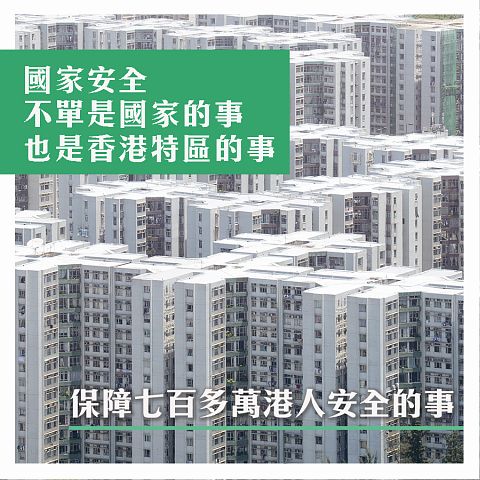Safeguard the country's bottom line Put Hong Kong back on track
14 June 2020

|

|
Speaking at the Webinar in Commemoration of the 30th Anniversary of the Promulgation of the Basic Law organised by the Hong Kong Special Administrative Region (HKSAR) Government last week, Deputy Director Zhang Xiaoming of the Hong Kong and Macao Affairs Office of the State Council raised and answered four "why" questions, stressing that "the stronger the bottom line of national security, the greater the room for 'One Country, Two Systems'". I cannot agree more with this statement.
I can still remember President Xi Jinping saying explicitly at the Inauguration Ceremony of the current-term HKSAR Government on 1 July 2017 that any attempt to endanger China's sovereignty and security, challenge the power of the Central Government and authority of the Basic Law of the HKSAR, or use Hong Kong to carry out infiltration and sabotage activities against the Mainland is an act that crosses the red line, and is absolutely impermissible.
President Xi also said that, after the return of Hong Kong to China, it is all the more important for us to firmly uphold China's sovereignty, security and development interests. In conducting day-to-day affairs, we must be guided by a strong sense of "One Country", firmly observe the principle of "One Country", and thus correctly handle the relationship between the HKSAR and the Central Government.
It goes without saying that this bottom line of our country is naturally and perfectly justified. With national security fully and wholly safeguarded and Hong Kong no longer a risk to it, we can enjoy security, stability and safety as well as ensure the smooth and long-term implementation of "One Country, Two Systems".
If Hong Kong can get back on track and move on with sustained stability, actively integrate into the nation's overall development, expand its horizons and inject new impetus, I firmly believe that, with the staunch support of the Central Government, there will be a bright future for us with unlimited development potentials and new opportunities ahead.
Regrettably, radicals have been advocating "Hong Kong independence" and "democratic self-determination" in recent years. They incited a great deal of illegal activities which escalated to near-terrorist acts, wilfully and blatantly challenging the bottom-line of the country. This gives a clear indication that Hong Kong has become a gaping hole in national security. As Deputy Director Zhang Xiaoming put it, these people had mistaken the restraint and tolerance shown by the Central and HKSAR Governments for weakness, and the situation in Hong Kong had deteriorated to the point that the Central Government had no choice but to intervene.
It is the absolute responsibility of a country to take timely and resolute action against any threat to its sovereignty and security. In this context, it is only natural that the Central Government has decided to enact the national security law for Hong Kong at the state level to tackling in a timely manner this most pressing issue. It also highlights the utmost importance attached to and the care for Hong Kong by the Central Government. In the past year, social unrest had brought Hong Kong to a crossroads. At this turning point, the national security law will serve as the "pillar of the ocean" for Hong Kong, providing us a chance to start afresh.
While Hong Kong is prepared to start again, a group of people are calling for a so-called "referendum by way of strike and class boycott" to oppose the legislation of the national security law. Such acts will undermine the interests of Hong Kong people and must be severely condemned. What is more exasperating and regrettable is that a civil service staff union is calling on civil servants to participate in the strike, blatantly undermining the interests of the whole community of Hong Kong and tarnishing the reputation of the civil service. The Government will not turn a blind eye to any such action.
I would like to remind civil servants that they should recognise the facts, remain rational and behave themselves, lest they will fail to meet the expectations of the community at large. Civil servants, as the backbone of the HKSAR Government, must accomplish the mission and task of safeguarding the security of Hong Kong and the nation with a sense of responsibility. They should stand united and be dedicated to their duties to ensure the successful implementation of "One Country, Two Systems", the prosperity and stability of Hong Kong as well as the provision of a safe environment for people to live and work.
As for students, my advice is to refrain from participating in those activities, so as not to become the bargaining chips and shields of people who manipulate politics. Teachers and parents should always care for their students and children, remind and guide them to distinguish right from wrong, walk on the right path and abide by the law, and make them realise that "without a country, there is no family".
As the epidemic is subsiding, many countries have shifted their focus to economic recovery. The HKSAR Government is no exception. There are endeavours to safeguard and create jobs, support the economy and relieve people's burden.
The Government has launched two rounds of relief measures under the Anti-epidemic Fund (AEF), covering 66 measures and 79 schemes, to enhance Hong Kong's overall capability in combating the pandemic and provide assistance to enterprises and members of the public hard hit by the pandemic or affected by anti-epidemic measures.
With a wide coverage, the two rounds of AEF measures feature the $81 billion Employment Support Scheme and other support measures for sectors hit by the epidemic and establishments affected by the social distancing measures. Many businesses and members of the public have already received the subsidies. Numerous enterprises and their employees1 have benefitted. As at the end of May, over $22 billion were disbursed under the two rounds of AEF measures, benefitting over 1.18 million persons and 130 000 enterprises/license holders.
We have also been communicating with stakeholders from different industries to consider various enhancement and improvement measures. The AEF Steering Committee under my chairmanship has approved proposals to enhance the existing measures as well as introduce new ones2. The new measures to be launched include, among others, the provision of subsidies for employment agencies, "casual employees" employed on a long-term basis in the construction sector, vehicle servicing workshops, dishwashing workshops, etc.
Having regard to the needs and actual circumstances of individual sectors or their employees, the Government will put in place exceptional support measures in a resolute manner to relieve their predicament. Bureaux and departments are racing against time to process applications and disburse subsidies to business establishments hard hit by the epidemic, so as to provide timely relief and help tide them over their financial difficulties.

